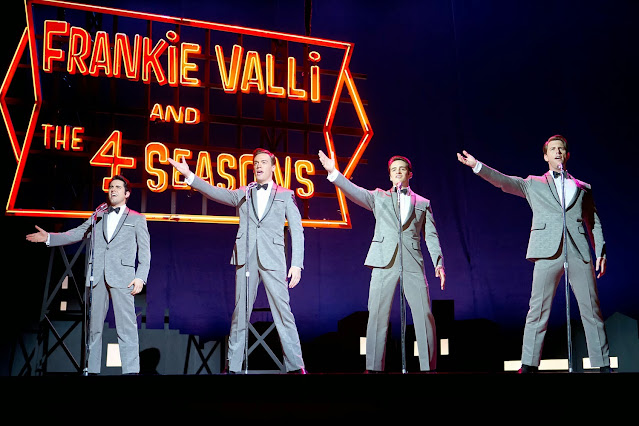Jersey Boys
JERSEY BOYS, the new film adaptation of the wildly successful, as-of-this-writing still running Broadway musical, is primarily aimed at undiscriminating Baby Boomers who remember when they first heard Frankie Valli's impressive falsetto on the radio back in the 1950s. I attended a matinee with dozens of them recently, and they ate every bit of it up. As we were exiting, a lady in said demographic complained to the teenagers waiting to clean the theater: "I can't believe the (Palm Beach) Post gave this a negative review. Probably written by a bunch of kids! This movie was perfect!"
That's being very generous, but I still enjoyed the heck outta this movie. Despite some reservations, I had fun. I've always had a fondness for show business tales, especially those involving the evolution of a band. There is a formula: musicians meet, discover mutual interests/talents, form a group, become successful, suffer infighting, split. This formula takes its blueprint from real life, of course. Like a group of Bellville, New Jersey guys, one of whom being Mr. Valli, discovering their ticket out of the 'hood. A place where stereotypical Italian parents warn you to be back by curfew as they slurp spaghetti and local big fish mafiosos tear a C-note and tell you to come back with the other half when you need a special favor.
Valli, who was born Frankie Castelluccio (John Lloyd Young), is headed for a career as a hairdresser before joining hustler Tommy DeVito (a magnetic Vincent Piazza), Nick Massi (Michael Lomenda), and songwriter Bob Gaudio (Erich Bergen) to eventually form the Four Seasons. There are several false starts and paying of dues along the way. Tommy and Nick, with a weakness for petty crimes, find themselves in and out of jail. Mobster Gyp DeCarlo (Christopher Walken) encourages Frankie to lose the shears and work hard at his God-given talent ("the rest will follow"). After, yes, Joe Pesci (Joey Russo) introduces the boys to Guadio, who had a hit with "Short Shorts," the rest is history.
The early scenes of JERSEY BOYS feel like GOODFELLAS-lite, but with fewer F-words and almost no violence. Though someone does hurl that patented Joisey insult "your mother's ass!" at least once. It makes you wonder how differently the movie would've played if Scorsese had been called upon to helm Marshall Brickman and Rick Elice's script instead of Clint Eastwood. Certainly the energy level would've been far more amped. Eastwood's ultra laid-back style is as recognizable as any director's stock in trade, and while the lighter tone of this project makes a good fit, it also allows some mild frustrations. Like a tendency for scenes to drift on and on, without a clear idea of how to conclude. At times, it's almost as if the actors, appearing baffled, are waiting for their boss to give them some indication of what to do next.
Some of the leads reprise their stage roles. I thought everyone was well cast. Eastwood gives himself a (interestingly timed) cameo, sort of. Walken, the only big star, gets to display those indescribable mannerisms, a bit more subdued this time. My only disappointment was with Renée Marino, who plays Frankie's wife, Mary. Not her performance, but how little the script gives her to do after her dynamite first few scenes. She is swallowed by the script's clichés, as a now alcoholic left at home wife, yelling at her husband for being on the road too much and being a poor father. It's a shame, after her electrifying entrance, that she's seen for the rest of the picture merely clutching a glass.
There is some grit in JERSEY BOYS, but nothing you could call edgy. What coulda been another raunchy slice of life ala MEAN STREETS, THE WANDERERS, or even SATURDAY NIGHT FEVER is rather some rose colored nostalgia, sanded down for your protection. And hey, no issue here, that's the film's (and play's) aim. To make its core audience feel good and maybe get all misty. To sing along.
Even within a very artificial landscape, Eastwood creates a believable mid 20th century canvas, right down to the plastic covers on couches. The barbershops. The cars. And each character stops within a scene (sometimes mid-song) to offer his take on the events ("Everyone remembers it how they need to"). The standard things: success causes rifts in marriages, power struggles, ill-advised debts, creative differences. There are scenes of wild parties, battles with intoxicants. One character's daughter dies way too young. But the real reason for the whole affair: we're there for the making of all the Four Seasons' hits, including "Walk Like a Man" and "Big Girls Don't Cry." Tough to resist, especially for those greying audience members who think music went downhill when Bobby Darin started singing protest songs.
And to be fair, there are some unexpectedly pointed moments, like at the end, during a 1990 reunion of each Four Season as they are inducted into the Rock and Roll Hall of Fame. Nick turns to the camera and explains why he quit the quartet in 1965: he felt like the Ringo Starr of the group.



Comments